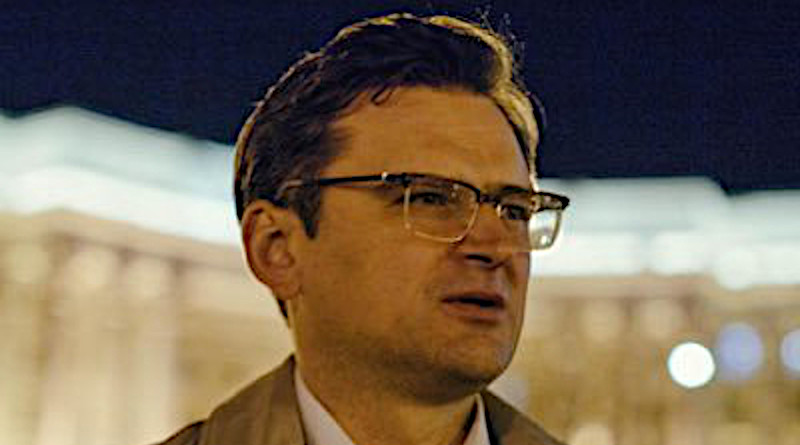Ukraine’s Kuleba Tells Critics Of Counter-Offensive To ‘Shut Up’
By EurActiv
By Alexandra Brzozowski
(EurActiv) — Ukraine’s Foreign Minister Dmytro Kuleba on Thursday (31 August) lashed out at critics of the slow pace of the country’s counter-offensive against Russia’s invasion.
Speaking after attending a meeting of EU foreign ministers, Kuleba said those finding fault with Ukraine’s lack of progress on the battlefield were “spitting in the faces” of Ukrainian soldiers and should “shut up”.
“Criticising the slow pace of [the] counter-offensive equals (…) spitting into the face of [the] Ukrainian soldier who sacrifices his life every day, moving forward and liberating one kilometre of Ukrainian soil after another,” Kuleba told reporters.
“Come to Ukraine and try to liberate one square centimetre by themselves,” he added, speaking alongside Spanish Foreign Minister Jose Manuel Albares.
Counter-offensive questioned
Kuleba’s furious comments came after US intelligence officers and other Western officials over the past weeks were quoted as saying that the offensive had made limited progress because Ukraine had too many troops in the wrong places.
Ukraine launched its counteroffensive against Russian troops in June but failed to break through the Russian lines and switched to slower and more careful operations while disrupting Russian rear areas with long-range precision strikes.
Kyiv began the next phase of its counteroffensive in late July with an attempt to penetrate Russian lines in the western Zaporizhia Oblast, but has so far made minimal gains, according to military analysts.
Ukraine’s most vocal supporters argue that the slow progress is linked to delays among allies in providing all the military equipment needed to be effective, including tanks, missiles and fighter jets.
Last week, the EU’s chief diplomat Josep Borrell admitted that the West’s hesitation in supplying all necessary weapons systems to Ukraine, driven by fear of escalation, has been costly and that a different approach could have changed the course of the war.
Failure to give Ukraine the support it needs to defend itself will have a higher cost for everyone, Lithuania’s Foreign Minister Gabrelius Landsbergis told EURACTIV.
More weapons requested
Kuleba’s lashing out came after he thanked EU foreign ministers for their support given so far, and urged them to supply his country with more lethal weapons, long-range missiles, armoured vehicles and air defence systems.
“The discussion that we’re having now with the German government is on providing Taurus long-range missiles — France and the United Kingdom already did so,” he told reporters.
Germany has so far been reluctant to provide Kyiv with this type of missile, which has a range of more than 500 kilometres, fearing that Ukrainian forces could use it for attacks deep into Russian territory.
“There is really not a single objective argument against making this [delivery] decision,” Kuleba said.
“It will help our counter-defensive, and therefore it will help to end the war sooner,” he added.
Kuleba also called “on all EU member states who operate F-16s to join the Netherlands, Denmark and Norway in contributing to the aviation coalition — not only in training but also with planes.”
Refurbishing ammunition?
On Wednesday (30 August), Borrell urged member states to order more ammunition for Ukraine, as figures showed the bloc remained short of a self-set March target of providing one million artillery shells within 12 months.
Borrell said contracts with defence companies had been signed to allow EU member states to place joint orders for 155-millimetre rounds, specifically requested by Ukraine.
“Now it’s [up] to the member states to pass concrete orders inside these framework agreements with the industry,” Borrell told reporters after a meeting of EU defence ministers.
The first element involved countries digging into their reserves or buying stock from elsewhere, which Borrell said have brought together about 224,000 ammunition rounds and 2,300 missiles, worth around €1.1 billion.
Those figures suggest that the EU has not even reached a quarter of its target yet.
The rest of the ammunition is meant to come from the second element of the plan – a joint procurement scheme that encourages EU member states to place orders for Ukraine and to replenish their own stocks.
But with no orders announced so far under the scheme, some EU members are urging the bloc to look at other options, such as a proposal from Slovakia to refurbish old rounds.
Slovakian Defence Minister Martin Sklenar said a company in his country was already carrying out refurbishment of artillery rounds that would otherwise be considered too old, and that such a scheme could be extended to other firms and countries.
“Slovakia is ready to provide its industrial capacity for extending the life of old and unused 155-millimetre ammunition from the warehouses of member states,” a Slovak diplomat told EURACTIV.
According to him, the country would be home to a defence company that could potentially refurbish “up to 12,000 ammunition pieces in a month”.
“The ambition of Slovakia is to draw attention to this option – it can save time and eliminate existing bottlenecks, it can be cheaper than production, quick and effective,” he said.

